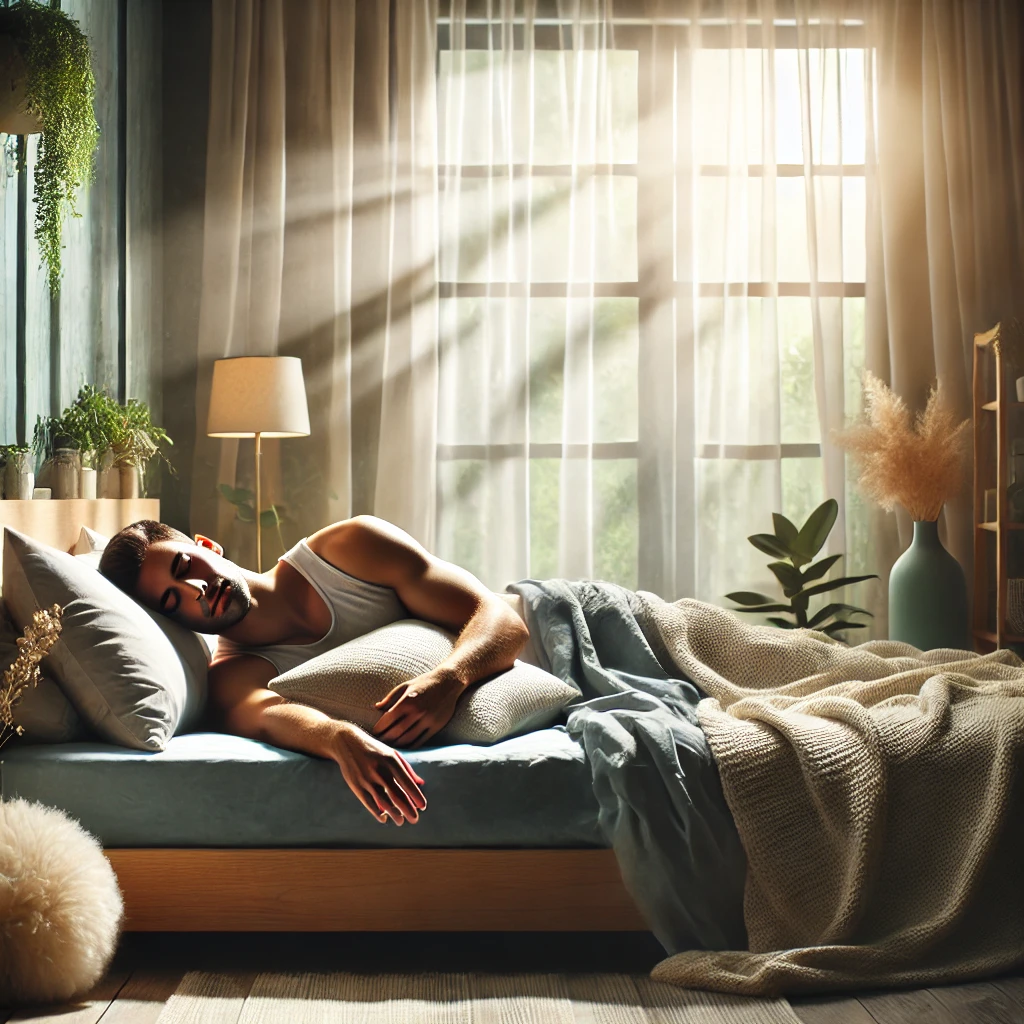Sleep Seeking
A life without adequate sleep loses much of its quality, as restful sleep is fundamental to well-being. The leading cause behind sleep issues for many people worldwide seems to be a lack of mental peace. The demands of modern life, including the relentless pursuit of success, material gains, and the constant race to stay ahead, often contribute to anxiety and stress. This state of mind disrupts sleep and drives people to seek temporary relief in substances like alcohol, tobacco, and sleeping pills, which unfortunately do not resolve the root issue.
Harvard University and other institutions have conducted studies to explore various factors affecting sleep, such as sleep posture, though it appears this isn’t a primary cause. Ultimately, sleep often comes naturally when one is at peace, even in challenging conditions, while a troubled mind struggles regardless of external comfort. Consistently, research indicates that disregarding natural rhythms and overburdening oneself often leads to sleep disturbances and undermines health.
Sleep Right, Live Bright
Always remember: challenging nature has consequences. Going against natural rhythms and habits can lead to a host of health issues, which we’ll explore further. To enjoy a vibrant, healthy life, prioritise a balanced lifestyle that aligns with natural principles. Allah made the night so that could be sleep.
A sleep Test or sleep study
A medical diagnostic tool used to track different components of an individual’s sleep is a sleep test, often known as a sleep study. Polysomnography, the most popular kind of sleep study, is carried out in a lab or sleep clinic. Brain waves (EEG), heart rate, breathing patterns, oxygen levels, and body movements are among the essential processes that are evaluated during the test in order to identify any abnormalities that can indicate sleep disorders. For symptoms like severe daytime drowsiness, loud snoring, choking noises while sleeping, or conditions like insomnia and sleep apnoea, specialists may suggest sleep tests.
Sleep Test Types
- Polysomnography (PSG): This nightly test checks for conditions like insomnia, obstructive sleep apnoea, and periodic limb movement by tracking several bodily systems. Technicians record physical motions linked to sleep disorders using sensors applied to the limbs, scalp, and chest while video is being monitored.
- The Multiple Sleep Latency Test (MSLT), sometimes referred to as the “nap test,” gauges how rapidly a person nods off during the day. It is necessary to diagnose disorders such as narcolepsy and is carried out following an overnight polysomnography to guarantee precise results.
- Sleep apnoea can be diagnosed at home using Home Sleep Apnoea Testing (HSAT), a condensed form of a sleep study that focusses mostly on respiratory processes. HSAT, which has a small number of sensors to track oxygen and breathing, is frequently advised for people with a moderate to high risk of obstructive sleep apnoea.
- The Maintenance of Wakefulness Test (MWT) evaluates the capacity to remain awake in a calm, unstimulated setting, in contrast to the MSLT. It is helpful for people whose vocations require them to be on guard, such pilots or truck drivers.
Getting Ready and What to Anticipate
Although there is usually no preparation required, some drugs, alcohol, and caffeine should be avoided before to a sleep test because they can change sleep patterns. Patients who plan to spend the night in a clinic are advised to bring their own sleeping aids, such as pillows. A technician observes and gathers data during the study, and a sleep specialist reviews the data afterwards.
Sleep specialists can identify particular issues and customise treatment strategies using the information gathered from sleep tests. For instance, cognitive-behavioral therapy (CBT) and lifestyle changes can be used to treat insomnia, whereas Continuous Positive Airway Pressure (CPAP) therapy or surgery can be used to treat sleep apnoea. Sources: UC San Diego Health, Stanford Medicine, and Columbia University Sleep Centers.
For those undergoing HSAT, a technician or healthcare provider will provide the device and instructions for setup at home. This option allows patients to maintain their usual sleep routine in a familiar environment.
The Significance of Sleep Tests
Healthcare professionals can learn more about the causes of sleep disorders by using sleep testing. For instance, MSLT assesses for narcolepsy by monitoring the time it takes to enter REM sleep, whereas PSG can identify abnormal breathing patterns and oxygen decreases, which are important signs of sleep apnoea. Sleep specialists examine and evaluate the gathered data, creating treatment programs that are specific to the needs and circumstances of each patient.
Because insufficient sleep raises the risk of heart disease, diabetes, obesity, and mental health problems, diagnosing and treating sleep disturbances is essential. Furthermore, if the underlying sleep issue is treated, daily symptoms like exhaustion and irritability frequently get better.
Conclusion
To diagnose sleep-related illnesses and enhance general quality of life, a sleep test is necessary. These tests, whether carried out at home or in a lab, yield useful information that directs suitable therapy alternatives. For information on the possible advantages of participating in a sleep study, people who are exhibiting signs of sleep disorders, such as snoring, excessive daytime sleepiness, or trouble staying asleep, should speak with a healthcare professional.Trusted resources that provide comprehensive details on different sleep tests and preparation tips include the Mayo Clinic, Sleep Foundation, and verywell Health.
Put your health before the constant chase of wealth and technology if you want to live a healthy life. Keep in mind that wealth becomes meaningless without health. The biggest wealth only your health.
Disclaimer
The Content provided here is for informational purpose only. This Blog is not intended to substitute for medical advice , diagnosis , or treatment. Always seek the advice of a qualified healthcare provider for any questions or concerns you may have regarding a medical condition. Writerspirit does not endorse or recommend any specific tests, physician , procedures ,opinion , or other information mentioned on the blog.
FAQs.
A Sleep Test: What Is It?
Polysomnography, another name for a sleep test, is a non-invasive diagnostic technique that tracks different physiological processes while you sleep. By examining breathing patterns, heart rate, sleep cycles, and other factors, it is intended to assist in the diagnosis of sleep disorders, including narcolepsy, insomnia, and sleep apnoea.
Why Would a Sleep Test Be Necessary?
For those who exhibit symptoms such as excessive daytime sleepiness, loud snoring, breathing pauses during sleep, frequent awakenings, or strange movements, a sleep test is advised. Making a diagnosis of these symptoms can assist choose the best course of action, enhance general health, and improve sleep quality.
Where Do Sleep Tests Get Performed?
Specialised sleep labs or clinics are often where sleep studies are carried out. A Home Sleep Apnoea exam (HSAT), which enables individuals to complete a condensed exam in the comfort of their own homes, may be suggested by doctors in certain situations.
How Can I Get Ready for a Sleep Exam?
Prior to the test, doctors usually advise against coffee, alcohol, and naps. To assist you relax, it’s beneficial to stick to your nighttime routine. Bring any comfort-related necessities, such a favourite pillow, sleepwear, and any prescription drugs that might need to be used overnight.
Do Sleep Tests Carry Any Risks?
In general, sleep testing are non-invasive and safe. The electrodes or monitoring devices may cause little discomfort, although this is only transitory. Although technicians strive to make patients as comfortable as possible, the sleep environment may feel strange in certain situations.
What is the duration of a sleep test?
Monitoring begins at bedtime and ends in the morning, and the majority of sleep tests are finished overnight. The following day, some tests, like the MSLT, can take longer.
How Do Outcomes Get Used?
A sleep specialist examines test results, analyses the information, and makes a diagnosis of any sleep disorders. Following that, treatment programs are customised to meet the needs of each patient and may involve medication, lifestyle changes, or specialised equipment such as a CPAP machine for sleep apnoea.

